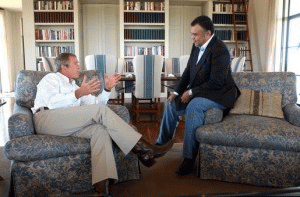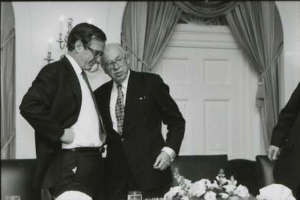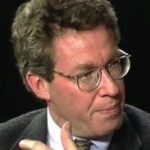Reprinted from Consortium News

President George W. Bush meeting with then-Saudi Ambassador Prince Bandar bin Sultan at the Bush Ranch in Crawford, Texas.
(Image by (U.S. government photo)) Details DMCA
In a stunning repudiation of Barack Obama's Middle East policies, Congress has overridden a presidential veto and confirmed that 9/11 survivors can sue Saudi Arabia for its role in the destruction of the World Trade Center.
The vote was a rare victory in a global political system in which the major powers routinely roll over ordinary civilians the way a tank rolls over a daisy. Whether it's a Yemeni wedding party pulverized by an errant bomb or a terrified office worker plummeting through space to escape the fire on 9/11, these are the sorts of people whom drone operators call "bug splats," individuals whose bloody remnants must be wiped away as quickly as possible so that the war machine can continue on its way. But now it looks like some of their surviving families may finally get their day in court.
As wonderful as this is, there's a problem. JASTA, as the Justice Against Sponsors of Terrorism Act is universally known, goes after the wrong people. Yes, Saudi hands are all over 9/11. As the inestimable Karen Breitweiser has pointed out the long-suppressed 28-page chapter (actually 29) of the Joint Congressional Report dealing with the Saudi role in 9/11 was a bombshell no matter how Washington and Riyadh try to deny it.
It described one link after another between Saudi officials and the 19 hijackers, 15 of them Saudi subjects. It notes, for instance, that the FBI received "numerous reports from individuals in the Muslim community" that Omar al-Bayoumi, a Saudi national who helped two of the hijackers after they arrived in the U.S., was a Saudi intelligence officer.
It says that Osama Bassnan, whom it describes as a supporter of Osama bin Laden, may have "received funding and possibly a fake passport from Saudi Government officials"; that he and his wife may also have received financial support from Saudi Ambassador Bandar bin Sultan, and that he received "a significant amount of cash" from another member of the royal family as well.
The report cites FBI documents saying that a phone book owned by Abu Zubaida, a senior Al Qaeda operative captured in Pakistan, contained the unlisted number of the company that manages Bin Sultan's vacation home in Aspen, Colorado.
Such links are remarkable, and if JASTA enables 9/11 survivors to pursue them further, then it's all to the good. Still, the legislation overlooks one all-important fact: 9/11 in the final analysis was less a Saudi job than an American one.
This doesn't mean that the CIA wired the Twin Towers with explosives or that Mossad somehow engineered the hijacking. What it means, rather, is that Washington has shaped the U.S.-Saudi relationship from the start and that it therefore must take responsibility for the horrors that have followed.
Made in the USA
The degree to which Saudi Arabia was made in the USA is often overlooked. But before the United States happened on the scene in the early 1930s, the kingdom was a great empty zone consisting of goats, flies, sand dunes, and a few thousand fanatical jihadis whom the British had no trouble taking care of when they threatened their holdings in neighboring Iraq and Jordan.

Then-Vice President George H.W. Bush with CIA Director William Casey at the White House on Feb. 11, 1981.
(Image by (Photo credit: Reagan Library)) Details DMCA
King Ibn Saud, whose stronghold was a desolate plateau known as Najd, was himself virtually a U.K. prisoner. Indeed, this is why he brought in American geologists when it appeared that significant oil deposits might lie beneath his country's shifting sands. An alliance with the U.S. was his only hope of getting out from under Britain's thumb.
Ibn Saud was a wily operator who eventually figured out how to use his oil wealth to gain leverage over U.S. oil companies as well. But leverage doesn't mean independence. To the contrary, it meant a deepening partnership with the U.S. that the Americans encouraged at every turn.
So durable was the relationship that events that should have torn it apart only made it stronger. The most obvious is the 1973 Yom Kippur War when America's pro-Israel policies led the Saudis to impose an oil embargo that quickly brought capitalism to its knees. Although President Richard Nixon and Secretary of State Henry Kissinger briefly considered seizing Saudi oil fields in retaliation, they eventually opted for an opposite policy based on ever closer economic integration.
(Note: You can view every article as one long page if you sign up as an Advocate Member, or higher).





